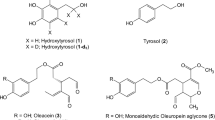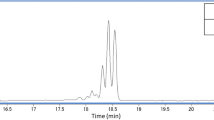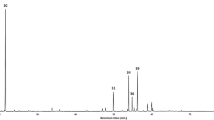Abstract
THE main hydrocarbons present in the essential oil of hop (Humulus lupulus L. var. Fuggles) are myrcene, farnesene, caryophyllene and humulene1 (Fig. 1). In an attempt to find the best conditions for quantitative assay of these substances, hop oil hydrocarbon fraction was examined by gas chromatography over a range of column temperatures. It was noticed that when the temperature of analysis was decreased from 150° C. to 125° C., the separation of caryophyllene and farnesene, incomplete at 150° C., became non-existent at 125° C. However, when the analysis was carried out at 175° C. complete separation was achieved. This is the converse of the expected behaviour of compounds in gas chromatography. The analysis was then carried out at intervals over the range 100°–200° C., and the retention volumes of the constituents determined.
This is a preview of subscription content, access via your institution
Access options
Subscribe to this journal
Receive 51 print issues and online access
$199.00 per year
only $3.90 per issue
Buy this article
- Purchase on Springer Link
- Instant access to full article PDF
Prices may be subject to local taxes which are calculated during checkout
Similar content being viewed by others
References
Howard, G. A., and Slater, C. A., Chem. and Indust., 495 (1957).
Author information
Authors and Affiliations
Rights and permissions
About this article
Cite this article
ROBERTS, J. Elution Sequence as a Function of Temperature in Gas Chromatography. Nature 193, 1071–1072 (1962). https://doi.org/10.1038/1931071b0
Issue Date:
DOI: https://doi.org/10.1038/1931071b0
Comments
By submitting a comment you agree to abide by our Terms and Community Guidelines. If you find something abusive or that does not comply with our terms or guidelines please flag it as inappropriate.



